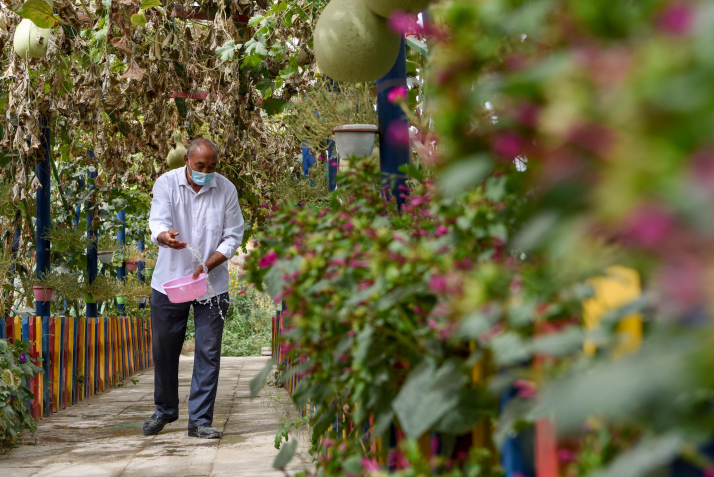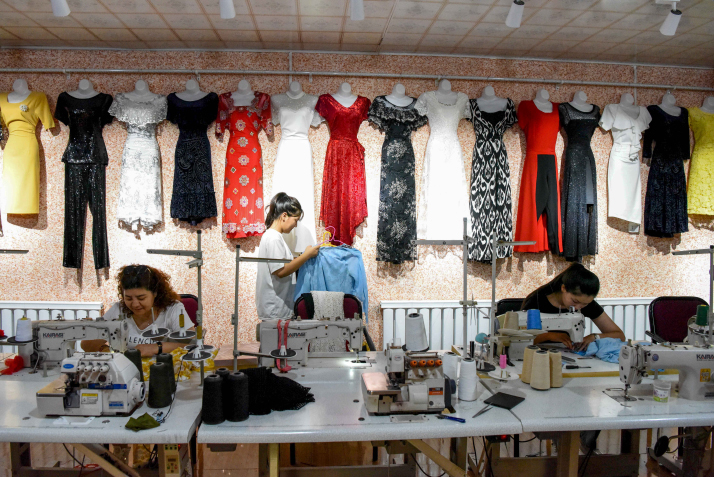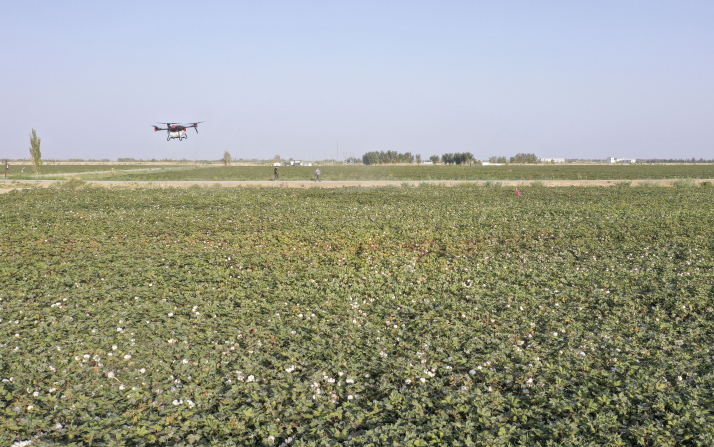
A villager cleans his garden in Daxi Village, Yuli County, on September 4, 2020 (XINHUA)
Walking into Daxi Village in Yuli County of Bayingolin Mongolian Autonomous Prefecture, one is immediately struck by the wide, straight asphalt roads and neatly arranged villas. Nearly every family owns a car and the well-maintained roads make it easy for residents to travel to the county seat. Moreover, every household now has access to tap water and natural gas.
However, life in Daxi was drastically different just over 40 years ago. Situated on the edge of the Taklimakan Desert—China's largest and the world's second largest drifting desert—the village faced harsh natural conditions.
It was once a barren, sparsely populated area plagued by severe saline-alkali soil. The challenging environment led to low agricultural output and, consequently, widespread poverty. Many villagers struggled to afford even basic necessities like food and clothing.
Over recent decades, however, the people of Daxi have worked tirelessly to transform their once impoverished home into the prosperous community it is today.

Workers make clothes at a workshop in Daxi Village on September 4, 2020 (XINHUA)
Pioneer of development
A key figure in this transformation is Sawut Monlik, now in his 70s. He was elected secretary of the Communist Party of China (CPC) Daxi Village Branch in 1980, the top position in the village, soon after the beginning of China's reform and opening-up policy.
In the early 1980s, China introduced the household contract responsibility system, under which farmland owned collectively by the village was entrusted to individual households, who took responsibility for their management, profit and losses. The previous "people's commune system" had been useful in mobilizing manpower for collective undertakings, such as irrigation projects and road improvements. However, its equal division of produce and profits, sometimes without equal participation, dampened farmers' enthusiasm and led to decreased output.
In 1982, Sawut applied to the local government to designate Daxi as a pilot for implementing this groundbreaking reform.
The reform boosted the villagers' incentive to farm, resulting in a bumper harvest that year. Wheat yields doubled compared to pre-reform levels. Not only did the village solve its food shortage, but also achieved an unprecedented per-capita income.
To combat the saline-alkaline soil, Sawut spearheaded efforts to dig drainage canals—ditches designed to remove salt and alkali from affected land. Every spring, large quantities of water were channeled into the farmland to dissolve and dilute the salt and alkali in the soil, with the drainage canals providing an outlet for the dissolved salt and alkali. He also led the villagers in planting trees to protect the farmland from sandstorms.
After a decade of dedicated effort, they transformed over 600 hectares of land into fertile, high-yielding fields.
Having solved the pressing issues of food and clothing, Sawut guided the villagers in establishing collective enterprises, including flour mills, brick factories and agricultural markets. These initiatives strengthened the village's collective economy, laying the foundation for future prosperity.

Drones spray a chemical defoliant ahead of harvest in a cotton field in Daxi Village on September 20, 2022 (XINHUA)
Thriving economy
In recent years, Daxi has diversified its economy and boosted resident income by developing e-commerce and rural tourism.
A big step was the establishment of the Yuli County E-Commerce Association in Daxi in 2015. The association provided critical support to the nascent e-commerce industry by offering free training to villagers, empowering them to sell their agricultural products online. Wang Xiaohong was one of the villagers who seized this opportunity.
"E-commerce professionals provided step-by-step guidance, clearly explaining everything from account registration to product marketing," Wang told People's Daily newspaper.
Equipped with her new skills, Wang launched her own online stores on e-commerce platforms to market the village's agricultural products.
She regularly creates and shares short videos showcasing Daxi's scenic beauty on social media platforms, aiming to increase her hometown's popularity with online users. "I hope everyone can learn more about Daxi Village and see how our agricultural products are made," Wang explained. "This will increase their trust in our products."
In 2022, Wang sold an impressive 12 tons of raisins online in just seven days, and her annual sales exceeded 1.5 million yuan ($205,986) in 2024.
That same year, a 3,000-square-meter e-commerce industrial park was established in Daxi. As of last year, the park had attracted over 200 e-commerce companies and individual vendors. The park had also trained 25 local villagers to become sales influencers and generated employment for 21 villagers in warehousing, logistics and delivery, boosting their average monthly income. In 2023, Daxi's e-commerce revenue reached a remarkable 175 million yuan ($24 million).
In addition to e-commerce, Daxi is developing tourism as another avenue to boost the incomes of residents.
The village environment has been given a makeover. Colorful fences enclosing flower beds line both sides of the roads. In spring and summer, blooming flowers give the village rich colors. Walking through its alleys, visitors can admire the exterior walls of the houses, which have been decorated with vibrant murals depicting the evolution of agriculture in Daxi, from traditional manual labor to mechanized and large-scale production.
Furthermore, the village's infrastructure has been significantly improved to facilitate tourism development. In 2018, Yuli County invested 7.5 million yuan ($1 million) in a comprehensive renovation project. This included hardening the village roads, constructing pathways for recreation, adding parking spaces, and planting flowers and other plants.
To attract visitors, Daxi hosts a variety of engaging activities, including a pear blossom festival and barbecue festival. These regular events feature captivating ethnic music, folk songs and dance performances by talented local artists, enriching the appeal of rural cultural tourism. From January to November 2024, Daxi welcomed over 51,000 tourists.
Villagers are enthusiastically participating in the development of tourism. Villager Reziwan Kaha has transformed his empty house into a homestay, and cultivated a thriving garden of fruit and vegetables in the open spaces in front of and behind the house. Tourists can stay at the homestay and enjoy the unique experience of picking fresh fruit and vegetables and savoring authentic local delicacies. Villager Ayiguli Aimur has established a small-scale, handmade yogurt plant, selling yogurt, cheese and similar products to tourists.
United, they stand
Ethnic unity is a cornerstone of Daxi's progress. "Wealth is not about money, but about the happiness found in unity and harmony." This is a guiding principle drawn from the village's own development experience.
Daxi is home to residents from both the Uygur and Han ethnic groups. Historically, Uygur villagers primarily focused on animal husbandry and fruit tree cultivation, while Han villagers mainly grew vegetables and cotton. Sawut encouraged the villagers to learn from one another.
Villager Aisha Wushuoer was among the first to reap the rewards of this approach. "I planted cotton on all my farmland in 1990, and my Han brothers helped me clear weeds, apply fertilizers, and irrigate the field," Aisha shared with China Ethnic News newspaper.
Today, Aisha has transformed his home into a "Unity Courtyard." Displaying papercut portraits featuring all 56 ethnic groups in China, he welcomes visitors and shares inspiring stories of how the people of Daxi, united as one, have achieved greater prosperity and a stronger sense of community.
The spirit of unity extends back decades, when people from across China arrived to support Xinjiang's development. Du Menghe was one of these pioneers, traveling to Daxi from Shandong Province in east China with his uncle and establishing a new life more than 40 years ago. Upon their arrival, the villagers welcomed them with open arms, helping them build new homes.
"The Uygur villagers shared their homes and their naan (a staple flatbread of Xinjiang) with us," Du recounted to China Ethnic News. "Our hearts were warmed, tears filled our eyes, and we knew we had found our home."
Decades later, ethnic unity remains the driving force behind Daxi Village's continued success. "The people of all ethnic groups here are like the poplars in the desert—our roots are intertwined, and our hearts are connected," Xatiguli Reheman, Secretary of the village's CPC branch, told People's Daily. "Daxi Village's remarkable transformation is a result of the collective efforts of all its people. As long as we remain united, our lives will undoubtedly continue to improve."


